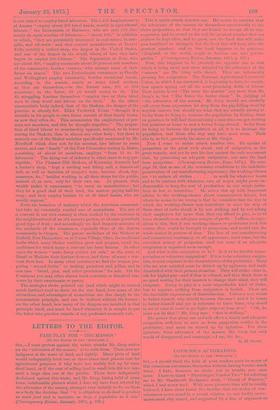LETTERS TO THE EDITOR.
FAIR-PLAY FOR " THE MASSES."
[TO THE EDITOR OF THE "SPECTATOR"] must protest against the unfair attacks Mr. Greg makes on the "advocates of the masses," as he calls them. These men are indignant at the waste of land, and rightly. Many plots of land would indisputably fetch two or three times their present rent for agricultural purposes if they were not unduly tied up by some dead hand, or if the cost of selling land in small lots did not take such a large slice out of the profits. These have indignantly declaimed against this waste, and Mr. Greg, laying hold of some loose, indefensible phrases which I dare say have been uttered by the advocates of the masses, attempts very unfairly to fix on them as.a body the doctrine that "it is obligatory on the land to produce as much food and to maintain as large a population as it can." (Contemporary Review, January, 1875, p. 190.)
This is unfair attack number one. He seems to consider that the advocates of the masses tie themselves unreservedly to the above proposition, so that they are bound to accept all its con- sequences, and to crowd on the soil the greatest number that can anyhow be kept alive, and to grow, not the food that will make men healthiest or strongest, but the food that will keep alive the greatest number ; and as that food happens to be potatoes,
"England, or the world, ought to become one vast potato- garden." (Contemporary Review, January, 1875, p. 191.)
Now, this happens to be precisely the opposite aim to that which is being more and more adopted by the advocates of the " masses " (as Mr. Greg calls them). They are vehemently pressing for emigration. The National Agricultural Labourers' Union, in which I am interested, is beginning to have its emigra- tion agents spying out all the most promising fields of labour. Their maxim is not "The more the merrier" any more than Mr. Greg's is, but " The fewer the better cheer." In judging of "the advocates of the masses," Mr. Greg should not carefully cull every loose expression let drop from the pig-killing stool by wayside orators, but should see what they are actually aiming at. So far from its being to increase the population by feeding them on potatoes, he will find them advising a man who can get nothing but potatoes at home to seek a better living abroad. So far from its being to increase the population at all, it is to decrease the population, that those who stay may have more room. Their aim is, in fact, precisely the same as Mr. Greg's.
Now I come to unfair attack number two. He speaks of pauperism as the great rock ahead, and of emigration as the great remedy, and yet he sets his face against the only movement that, by promoting an adequate emigration, can save the land from pauperism. (Contemporary Review, June, 187&) He says, page 59, that as one of the necessary conditions to the indefinite preservation of our manufacturing supremacy, the working-classes
are "to eschew all strikes to work for whatever hours and to be content with whatever rate of wages might prove in- dispensable to keep the cost of production in our staple indus- tries as low as heretofore." lie mixes this up with important advice to the working-classes about conscientious labour, but where he seems to me wrong is that he considers that the way in which the working-classes may contribute to steer the ship of State clear of rocks ahead, is by not striking and by not asking their employers for more than they can afford to give, so as to leave themselves an adequate margin of profit. I affirm, in oppo- sition to this, that if our working-classes or proletariat took this course, they would be brought to pauperism, and would ruin the whole nation in process of time. The loss of our manufacturing and commercial supremacy, to all appearance, must come, but the attendant misery of pauperism need not come if an adequate emigration is organised soon enough.
And what is this emigration to be ? Is it to be forcible trans- portation or voluntary emigration? If it is to be voluntary emigra- tion, it must originate in the dissatisfaction of the proletariat. Many who are now satisfied must be stirred up by agitators, and made dissatisfied with their present situation. They will strike—that is, ask for higher pay—and if that is refused, and they think there is no good waiting for their masters to change their mind, they will emigrate. Going to play is a most unprofitable kind of strike, but to separate striking from emigration is foolish. These are the inevitable expressions of dissatisfaction. Unless a man wants to better himself, why should he cross the seas ? and if he wants to better himself and yet is reluctant to leave home, why should he not do what he could to get higher wages at home fird? " Oh, he must not do that !" Mr. Greg says ; " that is striking."
The power that alone can and will effect a timely and adequate emigration sufficient to save us from pauperism resides in the proletariat, and must be stirred up by agitation. For these agitators, these advocates of the masses, Mr. Greg has only words of disapproval and contempt.—I am, Sir, &c., G. D. Sxow.






































 Previous page
Previous page